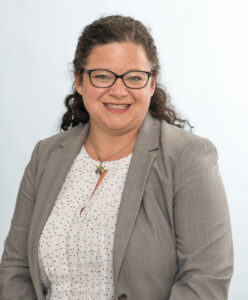Northeastern Illinois University
Wisconsin Teach ing Fellow, 2017-18
ing Fellow, 2017-18
Assistant Professor, College of Education
I participated in the WTFS fellowship and Faculty College when I worked as an assistant professor of education at UW-Parkside from 2015 to 2019. Scholarship of Teaching and Learning (SoTL) deeply informed my work as a teacher and researcher then and continues to influence my work in my current position as an assistant professor of special education at Northeastern Illinois University. At UW-Parkside, I worked with undergraduates pursuing teaching degrees. After learning about critical reflection through the fellowship, I studied my students’ reflections about institutional racism. This work led to a presentation and an ongoing analysis of how their thinking changed during one of my courses. I also co-created and co-taught a workshop for faculty members with an interdisciplinary team that included Natalia Taft, Rosanne Mason, and Damian Evans. We intentionally added an aspect of SoTL to our work with faculty to support their work making their teaching more culturally sustaining and anti-racist. It is one thing to adjust your teaching and invite students’ backgrounds into the university classroom, while also disrupting systems of dominance and oppression, but we also wanted faculty to assess the effectiveness of their efforts.
In 2019, I moved to Northeastern Illinois University where I coordinate the special education master’s program and work with pre-service and practicing teachers. I also collaborate with the Center for Teaching and Learning to work with faculty, most notably teaching a year-long workshop to integrate practices of equity and inclusion into their university teaching. My WTFS experiences continue to inform my teaching, especially in my assessment practices. We imbue critical reflection and ongoing improvement of teaching and learning into our workshops and in my classroom experiences. Through the fellowship, I learned about Kolb’s model (Kolb & Lewis, 1986) for reflection and we ask students and faculty to use this model of “What? So what? Now what?” in their final assessments of learning. I also use David Voelker’s list of norms for reflective discussions in my classes. Both of these approaches help people think more critically about their learning and experiences. Without a structured approach to reflection, my students were just summarizing what they learned without critically examining it. Participating in the WTFS opportunities has created indelible changes to my practice, especially around reflection.
Biography:
Dr. Jody Siker is an Assistant Professor in special education at Northeastern Illinois University in Chicago, IL. She received her B.S. in Biological Aspects of Conservation and Psychology from UW-Madison, M.S. in Exceptional Education from UW-Milwaukee, and Ph.D. through the Joint Doctoral Program in Special Education from the University of California, Berkeley and San Francisco State University. Her teaching focuses on special education teaching methods, collaboration, anti-racist pedagogy, disability history, and universal design for learning. She is also active in improving university faculty teaching methods and use of technology. Her research interests include co-teaching, using simulations, teaching methodologies, collaborating with families, math education, and anti-racist practices.
